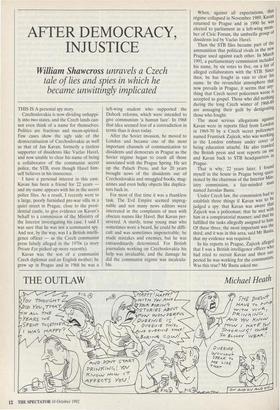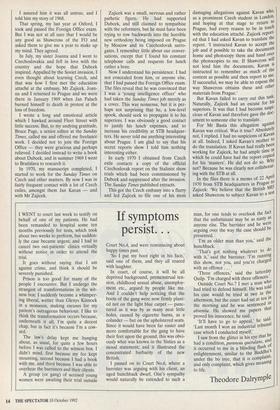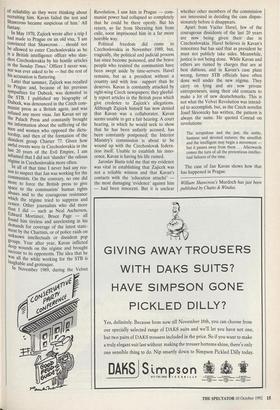AFTER DEMOCRACY, INJUSTICE
William Shawcross unravels a Czech
tale of lies and spies in which he became unwittingly implicated
THIS IS A personal spy story.
Czechoslovakia is now dividing unhappi- ly into two states, and the Czech lands can- not even think of a name for themselves. Politics are fractious and mean-spirited. Few cases show the ugly side of the democratisation of Czechoslovakia as well as that of Jan Kavan, formerly a tireless supporter of dissidents like Vaclav Havel, and now unable to clear his name of being a collaborator of the communist secret police, the STB, even though Havel him- self believes in his innocence.
I have a personal interest in this case. Kavan has been a friend for 22 years and my name appears with his in the secret police files. As a result, I recently went to a large, poorly furnished pre-war villa in a quiet street in Prague, close to the presi- dential castle, to give evidence on Kavan's behalf to a commission of the Ministry of the Interior investigating his case. I said I was sure that he was not a communist spy. And nor, by the way, was I a British intelli- gence officer — as the Czech communist press falsely alleged in the 1970s (a story Private Eye picked up more recently).
Kavan was the son of a communist Czech diplomat and an English mother; he grew up in Prague and in 1968 he was a left-wing student who supported the Dubcek reforms, which were intended to give communism 'a human face'. In 1968 that idea seemed less of a contradiction in terms than it does today.
After the Soviet invasion, he moved to London and became one of the most important channels of communication to dissidents and democrats in Prague as the Soviet regime began to crush all those associated with the Prague Spring. He set up the Palach Press, and for 20 years brought news of the dissidents out of Czechoslovakia and smuggled books, mag- azines and even bulky objects like duplica- tors back in.
For most of that time it was a thankless task. The Evil Empire seemed impreg- nable and not many news editors were interested in the complaints of men with obscure names like Havel. But Kavan per- severed. A sturdy, tense young man who sometimes wore a beard, he could be diffi- cult and was sometimes impenetrable; he made mistakes and enemies, but he was extraordinarily determined. For British journalists working on Czechoslovakia his help was invaluable, and the damage he did the communist regime was incalcula- ble.
When, against all expectations, that regime collapsed in November 1989, Kavan returned to Prague and in 1990 he was elected to parliament as a left-wing mem- ber of Civic Forum, the umbrella group of dissidents led by Vaclav Havel. Then the STB files became part of the ammunition that political rivals in the new Prague used against each other. In March 1991, a parliamentary commission included his name, by six votes to five, on a list of alleged collaborators with the STB. Since then, he has fought in vain to clear his name. In the revanchist atmosphere that now prevails in Prague, it seems that any- thing that Czech secret policemen wrote is accepted as gospel. Those who did nothing during the long Czech winter of 1968-89 are assuaging their guilt by denigrating those who fought.
The most serious allegations against Kavan were in reports filed from London in 1969-70 by a Czech secret policemen named Frantisek Zajicek, who was working in the London embassy under cover of being education attaché. He also trawled the British press and sent reports on me and Kavan back to STB headquarters in Prague.
That is why, 22 years later, I found myself in the house in Prague being ques- tioned by the chairman of the Interior Min' istry commission, a fair-minded man named Jaroslav Basta. Under Czech law, the commission had to establish three things if Kavan was to be judged a spy: that Kavan was aware that Zajicek was a policeman; that he met with him in a conspiratorial manner; and that he fulfilled the tasks allegedly assigned to hint. Of these three, the most important was the third, and it was in this area, said Mr Basta, that my evidence was required. In his reports to Prague, Zajicek alleged that I was a British intelligence officer who had tried to recruit Kavan and then sus- pected he was working for the communists' Was this true? Mr Basta asked me. I assured him it was all untrue, and I told him my story of 1968.
That spring, my last year at Oxford, I took and passed the Foreign Office exam. But I was not at all sure that I would be any good as Shawcross of the FO and asked them to give me a year to make up my mind. They agreed.
In July, my sister Joanna and I went to Czechoslovakia and fell in love with the country and the hope that Dubcek inspired. Appalled by the Soviet invasion, I even thought about learning Czech, and that was how I first met the education attaché at the embassy, Mr Zajicek. Joan- na and I returned to Prague and we were there in January 1969 when Jan Palach burned himself to death in protest at the loss of freedom.
I wrote a long and emotional article which I hawked around Fleet Street with little success. But, to my undying gratitude, Bruce Page, a senior editor at the Sunday Times, called me and offered me freelance work. I decided not to join the Foreign Office — they were gracious and perhaps relieved. I decided instead to write a book about Dubcek, and in summer 1969 I went to Bratislava to research it.
In 1970, my manuscript completed, I started to work for the Sunday Times on Czech and other matters. By now I was in fairly frequent contact with a lot of Czech exiles, amongst them Jan Kavan — and with Mr Zajicek. Zajicek was a small, nervous.and rather pathetic figure, He had supported Dubcek, and still claimed to sympathise with the reformers, but he must have been trying to row backwards into the horrible new orthodoxy being imposed on Prague by Moscow and its Czechoslovak surro- gates. I remember little about our conver- sations, except that I found his constant telephone calls and requests for lunch rather a bore.
Now I understand his persistence. I had not concealed from him, or anyone else, that I had passed the Foreign Office exam. The files reveal that he was convinced that I was a 'young intelligence officer' who had taken the Sunday Times job merely as a cover. This was nonsense, but it is per- haps not surprising that he, a low-level spook, should seek to propagate it to his superiors. I was obviously a good contact to justify his lunch expenses, and to increase his credibility at STB headquar- ters. He never told me anything interesting about Prague. I am glad to say that his secret reports show I told him nothing interesting either.
In early 1970 I obtained from Czech exile contacts a copy of the official Czechoslovak report on the Stalinist show trials which had been commissioned by Dubcek and suppressed after the invasion. The Sunday Times published extracts.
This got the Czech embassy into a flurry and led Zajicek to file one of his most damaging allegations against Kavan who, as a prominent Czech student in London, and hoping at that stage to return to Prague, had every reason to be in touch with the education attaché. Zajicek report- ed that I had asked Kavan to translate the report. 'I instructed Kavan to accept the job and if possible to take the documents home and photocopy them and hand over the photocopies to me. If Shawcross will not lend him the documents, Kavan is instructed to remember as much of the content as possible and then report to me. If successful, we may be able to expose the way Shawcross obtains these and other materials from Prague.' But Kavan failed to carry out this task.. Naturally, Zajicek had an excuse for his superiors. It was that I had become suspi- cious of Kavan and therefore gave the doc- ument to someone else to translate. For Mr Basta this allegation against Kavan was critical. Was it true? Absolutely not, I replied. I had no suspicions of Kavan at all. Indeed, I asked Kavan's mother to do the translation. If Kavan had really been working for Zajicek, he had ample time in which he could have had the report copied for his 'masters'. He did not do so. Why not? Because he was clearly not collaborat- ing with the STB at all. In the files there is a memo of 22 April 1970 from STB headquarters in Prague t° Zajicek: 'We believe that the British MI5 asked Shawcross to subject Kavan to a test
of reliability as they were thinking about recruiting him. Kavan failed the test and Shawcross became suspicious of him.' All fantasy.
In May 1970, Zajicek wrote after a trip I had made to Prague on an old visa, 'I am convinced that Shawcross . . . should not be allowed to enter Czechoslovakia as he is a British intelligence officer who slan- ders Czechoslovakia by his hostile articles in the Sunday Times.' Officer I never was, nor was ever asked to be — but the rest of his accusation is flattering.
Later that summer, Zajicek was recalled to Prague and, because of his previous sympathies for Dubcek, was demoted in the STB. I published my biography of Dubcek, was denounced in the Czech com- munist press as a British agent, and was refused any more visas. Jan Kavan set up the Palach Press and constantly brought me information about the suffering of the men and women who opposed the dicta- torship, and then of the formation of the dissident group Charter 77. Given how awful events were in Czechoslovakia in the last 20 years of the Evil Empire, I am ashamed that I did not 'slander' the odious regime in Czechoslovakia more often.
In all of that time I never had any rea- son to suspect that Jan was working for the communists. On the contrary, no one did more to force the British press to give space to the communists' human rights abuses and to the courageous resistance which the regime tried to suppress and censor. Other journalists who did more than I did — such as Neal Ascherson, Edward Mortimer, Bruce Page — all found him tireless and unrelenting in his demands for coverage of the latest state- ment by the Chartists, or of police raids on unknown intellectuals or dissident pop
groups. Year after year, Kavan inflicted deer. wounds on the regime and brought
succour to its opponents. The idea that he was all the while working for the STB is laughable and grotesque.
In November 1989, during the Velvet Revolution, I saw him in Prague — com- munist power had collapsed so completely that he could be there openly. But his return, so far from liberating him from exile, soon imprisoned him in a far more horrible way.
Political freedom did come to Czechoslovakia in November 1989, but, tragically, the political and judicial process has since become poisoned, and the brave people who resisted the communists have been swept aside by time-servers. Havel remains, but as a president without a country and with less support than he deserves. Kavan is constantly attacked by right-wing Czech newspapers; they gleeful- ly report articles in the British press which give credence to Zajicek's allegations. Although Zajicek himself has now denied that Kavan was a collaborator, Kavan seems unable to get a fair hearing. A court hearing, in which he would seek to show that he has been unfairly accused, has been constantly postponed; the Interior Ministry's commission is about to be wound up with the Czechoslovak federa- tion itself. Unable to establish his inno- cence, Kavan is having his life ruined.
Jaroslav Basta told me that my evidence was vital in establishing that Zajicek was not a reliable witness and that Kavan's contacts with the 'education attaché' the most damaging 'evidence' against him — had been innocent. But it is unclear whether other members of the commission are interested in deciding the case dispas- sionately before it disappears.
Apart from Vaclav Havel, few of the courageous dissidents of the last 20 years are now being given their due in Czechoslovakia. Havel believes in Kavan's innocence but has said that as president he must not publicly take sides. Meanwhile, justice is not being done. While Kavan and others are ruined by charges that are at best dubious, and in Kavan's case plain wrong, former STB officials have often done well under the new regime. They carry on lying and are now private entrepreneurs, using their old contacts to make a lot of new deutschmarks. This is not what the Velvet Revolution was intend- ed to accomplish, but, as the Czech novelist Josef Skvorecky has written, the pattern is always the same. He quoted Conrad on revolutions:
The scrupulous and the just, the noble, humane and devoted natures; the unselfish and the intelligent may begin a movement but it passes away from them ... Afterwards comes the turn of all the pretentious intellec- tual failures of the time.
The case of Jan Kavan shows how that has happened in Prague.
William Shawcross's Murdoch has just been published by Chatto & Windus.




























































 Previous page
Previous page